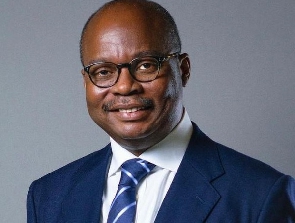Bank of Ghana has been recognized by His Excellency, the President of the Republic of Ghana, Nana Addo Dankwa Akufo-Addo for the distinguished roles it played during the fight to contain the COVID-19 Pandemic.
Specifically, the Bank had to immediately trigger its emergency support clause under Section 30 of the Bank of Ghana Act, 2002, Act 612, as amended, by purchasing a GH¢10 billion COVID-19 bond to support the government’s COVID-19 policy responses.
In addition, Bank of Ghana also provided an amount of GH¢10 million to the National Covid-19 Fund as seed-money, which enabled the Fund meet some critical health and social needs of those impacted by the pandemic.
Also, the Bank, in partnership with the private sector, provided GH¢10 million grant (in line with the Bank’s corporate social responsibility), to fast-track the construction of the Infectious Disease Centre at the Ga East Government Hospital, which became the nerve centre for managing the Covid-19 pandemic.
The Bank wishes to express its gratitude to His Excellency, Nana Addo Dankwa Akufo-Addo for the recognition of these unconventional policy measures, which was borne out of our quest to support the Government’s programme to preserve lives and ensure a safe and stable environment for economic growth.
Recently, however, Bank of Ghana has taken notice of public discussions on its role in helping resolve the current economic crisis, which raises concerns about their understanding and workings of monetary policy doctrines.
Since 2020, Central Banks all over the world have witnessed significant changes in the conduct of monetary policy due to the persistence of enormous shocks to the global economy. The spillover effects of these shocks were severe and costly, but have tendered to be grossly underestimated in the narrative of current economic developments in Ghana.
Whilst it is the case that the key function of monetary policy is price stability and maintaining the value of money, periods of crisis management, such as the Covid-19 pandemic, have come with dynamic and pragmatic policy response functions by central banks globally. In the face of the unprecedented pandemic shock, Central banks were placed at the forefront and acted in concert with fiscal authorities to take swift and forceful actions to preserve human lives.
In recognition of timely responses to the crisis, Central banks formed a critical line of defence, with critical policies to prevent market dysfunction and acted prudently in their capacity as lenders of last resort. Not only did most central banks cut interest rates, they also injected large amounts of liquidity to ensure financial stability amid an economic and health crisis.
Different tools were deployed to achieve objectives during the crisis – short term instruments, lending to financial institutions, outright purchases of government bonds, and regulatory and supervisory actions on the financial institutions.
For Bank of Ghana, the lessons learnt from the COVID-19 policy responses provided the blueprint in 2022 when the Government lost access to the capital market and financing critical government spending became a challenge. This second crisis was again managed prudently with central bank support to prevent disorderly defaults in debt service payments and help government machinery from grinding to a halt. This was done alongside working with the International Monetary Fund to craft a programme to resolve the economic crisis that faced the country.
Under such circumstances, all Central Banks would have reprioritised their objectives for the ultimate good of society. As a Central Bank, we have always acted in good faith to the benefit of Ghana, and we are confident that the economy will return to the path of stability and stronger growth sooner rather than later.
Business News of Wednesday, 15 March 2023
Source: www.ghanaweb.com
BoG given national honours for supporting fight against COVID-19
Entertainment












